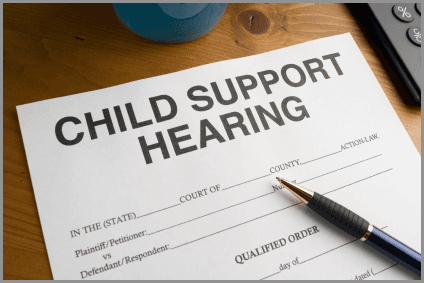July 30, 2019
Preparing for a Child Support Hearing
As you prepare for your child support hearing, know this list of things not to do.

You’ve received a summons to appear in court for child support! What do you do?
It's frightening to think that a judge who knows very little about you and your children will be determining how much child support you will owe (or receive). It’s frightening, in deed, yet today's child support system is built on this person interpreting financial information that will dictate your lifestyle for years to come. Certainly, the system isn't perfect, but it exists to protect and provide for children around the country.
Before you go to court, be aware that the Child Support Order will address paternity (if necessary), child support, medical support, custody (conservatorship) and visitation (possession and access). You will not be provided with an attorney for your child support hearing. In court, there will be an Assistant Attorney General (OAG) present, but this attorney represents the best interest of the state. The OAG does not represent you or the other parent.
As you prepare for your child support hearing, here's a list of things not to do:
1. Do not ignore your summons. We've all been there; sometimes you get so overwhelmed, it seems easier to just let it go, but it is imperative that you act to protect your interests. Aside from your court date, there could be other deadlines that are contained in the summons. If you're required to take action, do so in a timely manner. Don't put off replying to a request or contacting an attorney if you feel you’re going to need professional assistance.
2. Don't attempt to manipulate the information you're supplying to the courts. Be 100% truthful on each and every form you fill out and will all documentation you provide to your attorney and to the court. Don't neglect to report under-the-table income or over-report your financial needs in an attempt to control the amount of child support that will be awarded. Attempts to game the system in this manner are usually transparent and will reflect poorly on you in front of the judge.
3. Do not arrive late to your child support hearing –– or fail to show up at all. Do yourself a favor and get there early. This way, an unexpected traffic jam won't hinder your ability to present your case (or defense). Be patient and don't be surprised if your case doesn't start on time. If other cases are taking longer than expected, just use the time to settle your nerves and take a few deep breaths before your case begins.
4. Don't entertain unrealistic expectations. The court will determine child support based on all of the information supplied by using the state's child support guidelines. This item #2 (above) comes into play. In cases where the courts suspect voluntary underemployment, the judge will impute a party’s income. In other words, the court will establish child support based on what they believe the parent should be able to earn, based on past employment, education, etc. If the party has little-to-no actual income, then the amount of child support awarded is going to be minimal. While that may be disappointing, it's also important to be realistic as you look at the facts of your case and prepare yourself for court.
In many courts, parents are seen by an OAG or child support officer (CSO) prior to going before the judge’s bench for a court hearing. If there is a Family Violence Indicator on your case, the OAG or CSO will meet with each parent separately to negotiate the order. If any party to the case cannot agree on any of the terms of the child support order (paternity, child support, medical support, custody, visitation), a hearing before the judge will be necessary.
When/If that situation occurs, here’s a list of things to do:
1. Be prepared to speak about your wants, needs and concerns. In most cases, it is okay to write out your testimony and read it before the judge. The judge will determine what to include in the child support order (paternity, child support, medical support, custody, visitation) so the more information you can provide him or her, the better equipped he or she will be to make an accurate decision.
2. Ask for additional time, if needed. If you realize during the hearing that you need more time to prepare documentation, prepare testimony, or research safe options, ask for a reset or temporary orders which will postpone the final determination of your case. A reset means you will come back to court on another date and start from scratch. A temporary order may address part or all of the issues in the child support order for a specified amount of time; if a temporary order is granted, you will have to come back to court to get a final order at a later date specified by the court.
3. Be prepared to establish your work history. The OAG will ask you about your educational background and any special degrees or certifications you hold. You will also be asked about your current job as well as your employment from the past few years. If you are unemployed, the OAG will ask you to explain why. You will also be asked what steps you have taken to find employment and what jobs you have applied for in recent months. If you are underemployed, you will also be questioned about this. Determining your work history is important because it lets the judge know what you are capable of earning.
4. Be prepared to provide proof of income. The OAG will question you about your income from all sources, including your full-time or part-time employment, and unemployment and disability compensation. You will be asked about your receipt of public assistance or Social Security. You will also be asked about income you may receive from a pension or from your assets, such as dividends on stocks. It is a good idea to bring paperwork with you to prove your income. This paperwork would include your pay stubs, IRS W-2 forms and your latest tax returns.
After a child support order is finalized, both parents must comply with the court’s order. This means that the person ordered to pay child support must pay child support and the person with primary custody must allow any visitation that is ordered. Failure to do so could result in a party being held in contempt and jailed for up to six (6) months.
If you have an upcoming child support hearing, be sure to work with the best in the area.
Contact the Law Office of Arthur J. White III, P.C. today to learn more.
Share Post:
Leave Your Comment
search Article
Recent Posts





